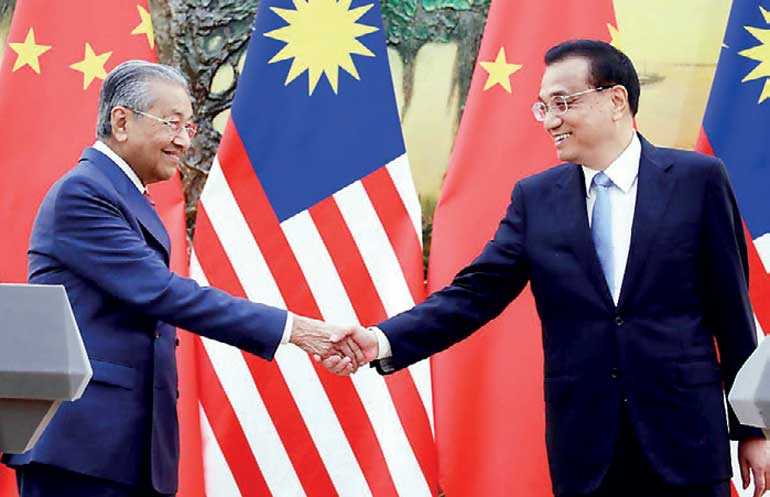Thursday Feb 19, 2026
Thursday Feb 19, 2026
Tuesday, 21 August 2018 00:00 - - {{hitsCtrl.values.hits}}
 Malaysia’s Prime Minister Mahathir Mohamad (L) shakes hands with China’s Premier Li Keqiang at the end of a news conference at the Great Hall of the People in Beijing, China, 20 August – Reuters
Malaysia’s Prime Minister Mahathir Mohamad (L) shakes hands with China’s Premier Li Keqiang at the end of a news conference at the Great Hall of the People in Beijing, China, 20 August – Reuters
BEIJING (Reuters): Malaysian Prime Minister Mahathir Mohamad said on Monday he believed China would sympathise with his country’s “internal fiscal problems” as he seeks to renegotiate, or possibly cancel, more than $20 billion in Chinese-funded projects.
Mahathir said after meeting Chinese Premier Li Keqiang in Beijing he did not believe in confrontation with any country and stressed the benefits Malaysia stood to gain from increased exposure to Chinese trade, technology and entrepreneurship.
“We hope also to get China to understand the problems being faced by Malaysia today,” Mahathir told a joint news conference with Li.
“I believe that China will look sympathetically toward the problems that we have to resolve and perhaps helping us to resolve some of our internal fiscal problems,” he said.
Mahathir did not mention the projects in question but he vowed repeatedly before his China visit to discuss what he called “unfair” Chinese infrastructure deals authorized by former premier Najib Razak.
Najib courted Chinese investment and was a cheerleader for President Xi Jinping’s signature Belt and Road Initiative in Southeast Asia during his decade-long rule, but Mahathir has questioned the value of the deals and the risk that they would leave Malaysia “indebted” to China.
Mahathir made no mention of Low Taek Jho, the Malaysian financier wanted for his role in the multi-billion-dollar scandal at state fund 1MDB.
The Wall Street Journal reported on Friday that Malaysia believed Low was being harbored in China and that a request to extradite him would be high on Mahathir’s agenda during his five-day trip. Reuters could not verify the report.
Chinese Foreign Ministry Spokesman Lu Kang said he was not familiar with Low’s case.
“But on principle, China is willing to, on the basis of mutual consultations, start normal legal cooperation with other countries,” he told a regular news briefing.